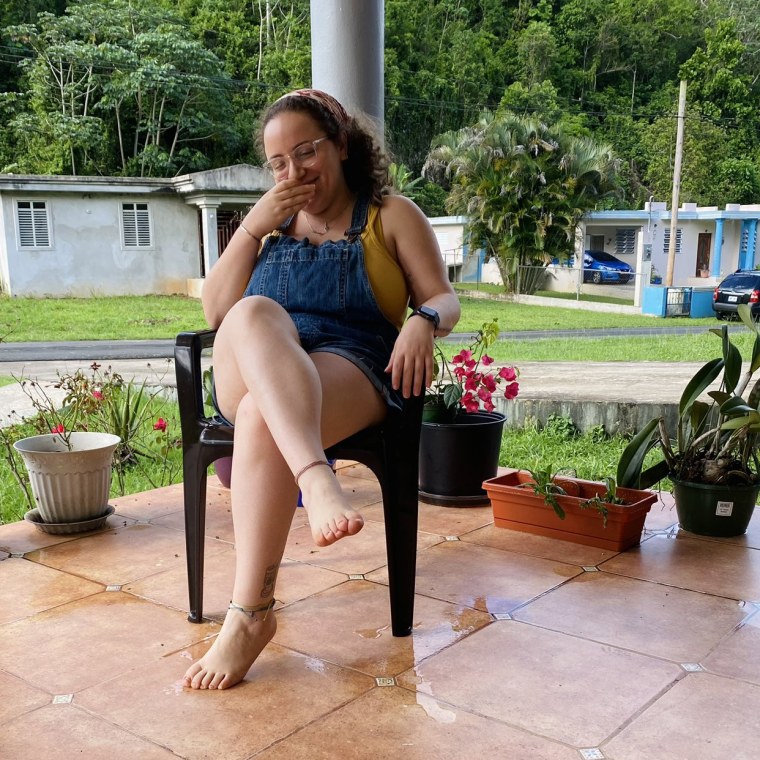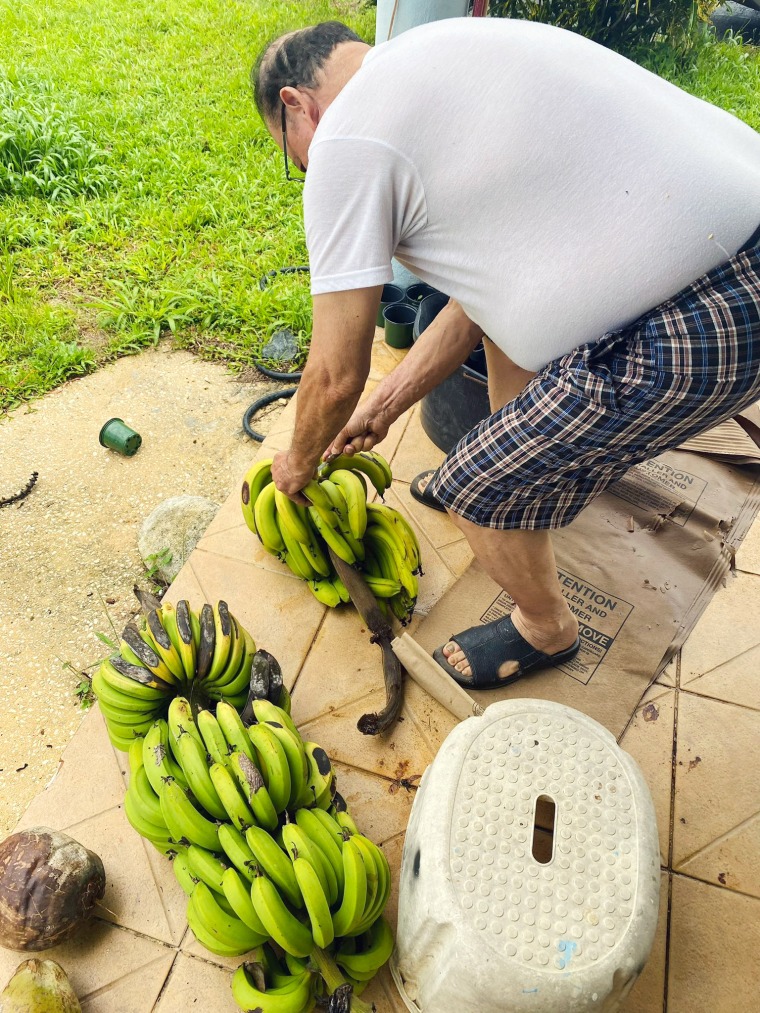When Nicole Ortiz saw Bad Bunny’s “Debí Tirar Más Fotos” album cover for the first time, the Florida resident thought back to her visits to Puerto Rico and the huge parties where her relatives would play dominoes at the table and that feeling of love and togetherness.
“I see my grandmother in that chair playing dominoes with my uncle and dad,” Ortiz, 48, told NBC News.
Bad Bunny called his recent album, which translates to “I should have taken more photos,” his “most Puerto Rican” album yet — and many fans agree.
The cover, which features two plain white plastic chairs in a backyard full of bright green plants, has brought people smiles — and tears. The chairs, which are known as Monobloc chairs, are versatile and inexpensive chairs that can be found in countries all over the world, and they are used both indoors and outdoors.
“Both my grandmothers have passed, and the chairs represent good times that involved Latin music, traditional foods and dancing,” Ortiz said. “It brings me sadness they aren’t here but also brings me happiness that I have those memories.”
Bad Bunny’s nostalgic message and iconic “DtMF” song have resonated with Latino and non-Latino fans, putting it at No. 1 on the TikTok’s Top 50 list.
Puerto Rican and other TikTok users have posted photos of their families in the two white chairs and see the album as an ode to their upbringing.
A user posted a photo of her as a little girl with her grandmother on her birthday and said the cover immediately made her nostalgic. Another user said the chairs are where a lot of Latinos spend time with their families gossiping and talking about current events. She said she is who she is today because of the conversations in the white chairs.
Bad Bunny’s latest album is an homage and a love letter to the island and a call for Puerto Ricans to protect their culture. From his use of folkloric bomb and plena music to a short film showing the effects of gentrification in Puerto Rico, the album highlights the island’s beauty and struggle.
Uniting Puerto Ricans away from the island
Dinatalia Farina, 29, said the album has made her rethink her idea of home. The album cover and its songs reminded Farina, 29, a Puerto Rican from New York, that home doesn’t necessarily need to be a physical place but instead can be a feeling full of nostalgia, rhythm and dance.

“We are the reminders of home,” Farina said. “We are the people that are going to continue these traditions that remind us of home.”
Ortiz, who lives in Florida, has struggled with her Puerto Rican identity her whole life. Although she has never lived in Puerto Rico, she was raised with the culture and feels connected to it in an emotional way. However, she would often think she wasn’t “Puerto Rican enough” because of her separation from the island.
When she saw the chairs on the album cover, she started to reminisce about the visits to Puerto Rico, from birthday parties in the backyard to eating food her grandmother cooked on the patio.
The album reminded her it’s OK not to live in Puerto Rico and still be Puerto Rican.
“All of our traditions come from the island of Puerto Rico, and this album made me feel more connected to it,” Ortiz said. “I think it speaks to anyone who is connected to another culture.”
Crossing cultures, from Latin America to South Asia
Erika Pradillo, 32, a Miami resident of Cuban and Spanish heritage, said that growing up she had a mini pink plastic chair where she used to do homework. Once she outgrew it, her grandmother would use it in the shower. She sees the album cover’s chairs as a symbol of her roots. She sometimes feels like she’s losing the connection to her culture, but the album helped remind her to always find her way back home.
“To me, the empty chairs reflect how so many Latinos have become more and more removed from their roots,” Pradillo said. “What tethers so many of us to those roots in the first place are the people that sat in those chairs — our grandparents, our great aunts and uncles, our parents.”
Leila Haddaji, 25, of Morocco, shared a similar sentiment.
“It reminds us of family gatherings, shared meals and moments of connection,” Haddaji said. “However, for many immigrants or those who have left their homelands, the empty chair becomes a poignant reminder of what was left behind — the home, the family or even a part of their identity.”
While many social media posts come from Latinos, South Asians in the diaspora have hopped on the trend, reminiscing about the places and loved ones they left behind.
Though the album’s songs are in Spanish, it’s resonating with first- and second-generation South Asians, transcending language barriers with its message.
South Asians are posting videos to the song’s “DtMF” (the initials for the album’s title) chorus, which translates to: “I should have taken more pictures of when I had you/I should have given you more kisses and hugs as many times as I could.”
A London-based creator who goes by Majestic Kay on TikTok said that she doesn’t speak Spanish but that hearing the song reminded her of the six months she spent with family in India.
“This trend but for missing home in India. Six months wasn’t enough,” she wrote in the caption.
Noren Ahmad, 20, a Pakistani German creator, posted clips from her time in Pakistan to the catchy chorus.
Even though Ahmad doesn’t speak Spanish fluently, the song reminded her of Pakistan — which she visited for the first time in 10 years in 2022.
“The song just feels like nostalgia,” Ahmad said. “I feel like I’m always going to be longing for Pakistan. My heart is always going to remember Pakistan. It’s the one place where my heart feels at peace, where I feel like I don’t have to change.”
In another montage to the song, Ahmad asks: “What if our parents didn’t have to leave?”
The song reminds Tahmina Begum, a Bangladeshi British user, of visiting Bangladesh and the feeling of not knowing when she’ll see her loved ones there again.
“Debí Tirar Más Fotos” has also helped people grieve their loved ones who have passed.
Bad Bunny’s message to take more photos of loved ones has hit home, with users starting a trend on social media posting memories of family members who are no longer in their lives. Bad Bunny reacted to the trend by posting a teary-eyed video on social media.
Farina said that whenever she goes to Puerto Rico to visit her family, she is always the one with her camera out taking photos of them. She sees a reflection of the Puerto Rican diaspora in the photos of her grandparents, aunts and uncles and cousins.

“Every time I visited Puerto Rico, I would cry because I didn’t want to come back to New York,” Farina said. “I wanted to stay and move there. When I would come back, I noticed I would flip through my photos a lot. Home is not limited to just a place.”
Bad Bunny announced a residency for his sixth studio album in Puerto Rico this summer; he recently added shows, but they have all sold out.
Farina hopes she can still attend the residency so she can see all of the music come to life onstage.
“I’ve cried so many times to this album; it’s absolutely beautiful,” Farina said. “I’m so proud to be Puerto Rican.”







